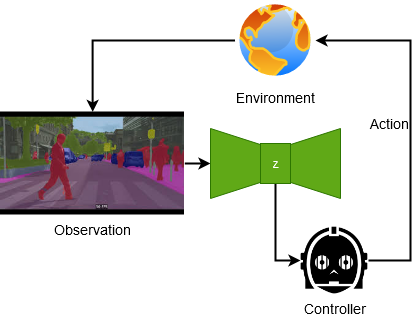Seminar: Robot Learning
Prof. Dr. Abhinav Valada
Co-Organizers:
Julia Hindel Adrian Röfer Rohit Mohan Nick Heppert Jan Ole von Hartz Iana Zhura
Deep learning has become a key enabler of real world autonomous systems. Due to the significant advancement in deep learning, these systems are able to learn various tasks end-to-end, including for perception, state estimation, and control, thereby making important progress in object manipulation, scene understanding, visual recognition, object tracking, and learning-based control, amongst others. In this seminar, we will study a selection of state-of-the-art works that propose deep learning techniques for tackling various challenges in autonomous systems. In particular, we will analyze contributions in architecture design, and techniques selection that also include computer vision, reinforcement learning, imitation learning, and self-supervised learning.

Course Information
|
Details:
|
Course Number: 11LE13S-7317-M
Places: 12
Room 00.021, building 080
|
|
Course Program:
|
Introduction: 20/10/2023 @ 13:00
How to make a presentation: 12/01/2024 @ 13:00
Block Seminar: 09/02/2024 @ 09:00
|
|
Evaluation Program:
|
Seminar Presentation: 09/02/2024
Summary Due Date: 23/02/2024 @ 23:59
|
|
Requirements:
|
Basic knowledge of Deep Learning or Reinforcement Learning
|
|
Remarks:
|
Topics will be assigned for the seminar via a preference voting. If there are more
interested students than places, places will be assigned based on priority
suggestions
of the HisInOne system and motivation (tested by asking for a short summary of the
preferred paper). The date of registration is irrelevant. In particular, we want to
avoid that students grab a topic and then leave the seminar. Please have a coarse
look
at all available papers to make an informed decision before you commit.
|
Course Material
|
Slides:
|
Lecture 1: Introduction
Lecture 2: How to Make a Good Presentation
|
|
Templates:
|
Additional Information
Enrollment Procedure
- Enroll through HISinOne, the course number is 11LE13S-7317-M.
- The registration period for the seminars is from 16/10/2023 to 23/10/2023.
- Attend the introductory session on 20/10/2023.
- Select three papers from the topic list by 23/10/2023 and complete this form .
- Places will be assigned based on priority suggestions of HISInOne and motivation of the student on 26/10/2023.
Evaluation Details
- Students are expected to prepare a 20-minute long presentation and draft a summary.
- The seminar will be held as a "Blockseminar".
- The slides of your presentation should be discussed with the supervisor two weeks before the Blockseminar.
- The summary should not exceed ten pages (excluding bibliography). Significantly longer summaries will not be accepted.
- Ensure you cite all work you use including images and illustrations. Where possible, try to use your own illustrations.
- The final grade is based on the oral presentation, the summary, and participation in the blockseminar.
What should the Summary contain?
The summary should address the following questions:
- What is the paper's main contribution and why is it important?
- How does it relate to other techniques in the literature?
- What are the strengths and weaknesses of the paper?
- What would be some interesting follow-up work? Can you suggest any possible improvements in the proposed methods? Are there any further interesting applications that the authors might have overlooked?
Graded Component Submission
- Save your document as a PDF and directly submit it to your topic supervisor via email.
- The filename should be in the format "FirstName_LastName_X.pdf" where X is the evaluation component (Abstract / Summary / Presentation).
Topics
-
Learning Reusable Manipulation Strategies
Supervisor: Adrian Röfer
-
Behavior-Tree Embeddings for Robot Task-Level Knowledge
Supervisor: Adrian Röfer
-
Procedure-Aware Pretraining for Instructional Video Understanding
Supervisor: Adrian Röfer
-
GNFactor: Multi-Task Real Robot Learning with Generalizable Neural Feature Fields
Supervisor: Nick Heppert
-
Cross-Domain Transfer via Semantic Skill Imitation
Supervisor: Nick Heppert
-
General In-Hand Object Rotation with Vision and Touch
Supervisor: Nick Heppert
-
M2T2: Multi-Task Masked-Transformer for Object-centric Pick and Place
Supervisor: Jan Ole von Hartz
-
Semantic-SAM: Segment and Recognize Anything at Any Granularity
Supervisor: Jan Ole von Hartz
-
Diffusion Policy: Visuomotor Policy Learning via Action Diffusion
Supervisor: Jan Ole von Hartz
-
Few-Shot Point Cloud Semantic Segmentation via Contrastive Self-Supervision and Multi-Resolution Attention
Supervisor: Julia Hindel
-
Handling Open-Set Noise and Novel Target Recognition in Domain Adaptive Semantic Segmentation
Supervisor: Julia Hindel
-
Towards Unsupervised Object Detection from LiDAR Point Clouds
Supervisor: Julia Hindel
-
Open-set Semantic Segmentation for Point Clouds via Adversarial Prototype Framework
Supervisor: Rohit Mohan
-
MDQE: Mining Discriminative Query Embeddings to Segment Occluded Instances on Challenging Videos
Supervisor: Rohit Mohan
-
Hidden Gems: 4D Radar Scene Flow Learning Using Cross-Modal Supervision
Supervisor: Rohit Mohan
-
Learning Visual Locomotion with Cross-Modal Supervision
Supervisor: Iana Zhura
-
Delivering Arbitrary-Modal Semantic Segmentation
Supervisor: Iana Zhura
-
Missing Modality Robustness in Semi-Supervised Multi-Modal Semantic Segmentation
Supervisor: Iana Zhura
Questions?
If you have any questions, please direct them to Julia Hindel before the topic allotment, and to your supervisor after you have received your topic.

